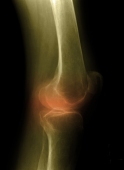
THURSDAY, Oct. 10 (HealthDay News) — Taking vitamin D supplements does not prevent the bone weakening of osteoporosis in healthy adults, a new review finds.
Nearly half of people aged 50 and older use vitamin D supplements, but these findings suggest that there is no need for healthy adults to take these supplements to combat osteoporosis. Instead, the use of these supplements should be focused only on people who are likely to be vitamin D deficient, the New Zealand researchers said.
One expert in the United States agreed with that advice.
“The review supports previous studies that found that vitamin D alone is not preventative in healthy adults,” said Victoria Richards, an assistant professor of medical sciences at the Netter School of Medicine at Quinnipiac University in Hamden, Conn. “From this study, consumers may no longer feel the need to continue purchasing vitamin D supplements for the prevention of osteoporosis,” she said.
Researchers led by Ian Reid of the University of Auckland looked through data from 23 studies that included a total of more than 4,000 healthy adults, average age 59.
The data turned up no evidence that taking vitamin D for an average of two years improved bone mineral density at the hip, spine, forearm or the body as a whole.
Bone mineral density measures the amount of bone mineral present at different sites and is used to assess bone strength.
The only significant increase in bone density (0.8 percent) in people taking vitamin D supplements was seen at the neck of the thigh (femoral) bone, according to the findings published online Oct. 10 in The Lancet.
There is “very little evidence of an overall benefit of vitamin D supplementation on bone density,” the researchers said, and “continuing widespread use of vitamin D for osteoporosis prevention in community-dwelling adults without specific risk factors for vitamin D deficiency seems to be inappropriate.”
But another expert said the decision to take vitamin D still rests with the individual.
“From a medical perspective, the answer as to whether one should supplement is an individual one that is best discussed with a patient’s primary care provider,” said Dr. Neil Roth, an orthopedic surgeon at Lenox Hill Hospital in New York City. “One must also weigh the potential downside for supplementation, and in this case there is very little harm in taking vitamin D for a healthy individual.”
Therefore, for some, “the potential benefit to supplement may outweigh the economic downside to supplementing, but that should be determined on an individual basis,” Roth said.
More information
The U.S. National Institutes of Health Office of Dietary Supplements has more about vitamin D.
Copyright © 2025 HealthDay. All rights reserved.

